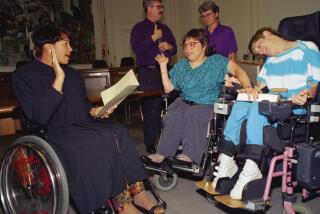‘Signing’ Lawyer Can Lend a Legal Hand to the Deaf
- Share via
CLEVELAND — A lot of clients are referred to attorney Nancy Leibold by “word of hand.” The former teacher of the deaf studied law with the aim of helping deaf people contend with the legal system.
Before law school, she studied to become a teacher. Then there was more school to learn sign language.
Deaf people may be misunderstood and mistreated by law enforcement officers and the courts, Leibold said. They also are forced to use interpreters to communicate with lawyers.
“One of my goals, when I first was teaching, was independence for deaf people,” she said. “That’s one reason I did this, so that a deaf person could come to me independently, on his own, with privacy, and tell me the problem without an interpreter there.”
By fluent use of sign language, she can keep her clients informed of what is going on during legal proceedings.
“A lot of times, the deaf person is left in the dark,” she said. “Sometimes a hearing person shows up and just takes care of it.
Understanding Is Key
“I make sure that my clients understand everything. I break down the legal language to the most basic language, if I have to. It’s really important that they understand.”
Leibold’s first contact with the deaf came in junior high school in suburban Cleveland. She remembers a deaf classmate struggling to present an oral book report in an English class. “It impressed me so much,” Leibold said. “I just can’t imagine having to do that. She was really brave.”
Leibold, 32, studied to become a teacher of the deaf at Kent State University. The university program emphasized oral communications, so she did not learn sign language there.
The accepted teaching method now combines lip-reading and sign language, she said. “Lip-reading is an important skill to learn, but you can’t depend on it totally,” she said, since only a third of speech sounds can be picked up from lip movement.
Leibold mastered sign language while teaching at the Regional School for the Deaf in Brownsville, Tex. Her roommate, who also taught at the school, was an experienced signer. “We spent every minute signing,” she said.
Interpreted in Court
After two years in Brownsville, she moved to San Antonio, where, in addition to teaching, she worked as an interpreter for the deaf. Her experiences interpreting at court hearings led to her decision to study law.
When she applied to law schools, instead of a lengthy essay, she wrote three sentences to explain her motive: “I’m a teacher of the deaf. I speak sign language fluently. I want to be a lawyer for the deaf.”
“It was the whole reason I wanted to go to law school,” she said.
When she began looking for a job three years ago, after graduation from Cleveland State University’s Cleveland-Marshall College of Law, Leibold couldn’t find a position that would allow her to develop a clientele among the deaf. She decided to start her own practice.
“Nobody knew what to do with this person that wanted to be a lawyer for deaf people,” she said.
She’s now with a suburban law firm, and the majority of her work is for deaf clients.
Leibold handles criminal, civil, real estate and divorce cases. She uses a portable typing device to communicate with some clients by phone.
Practice Meets Needs
“I have to do so many areas of law because I pick my clientele, rather than picking the area of law,” she said.
In Ohio, court-provided interpreters for deaf defendants are required in criminal and juvenile cases, but not others, she said. For simple cases, Leibold said, she can interpret for her client, but that doesn’t work during a trial.
“It’s very hard to concentrate and think about your case and interpret what the other guy is saying at the same time,” she said.
Unlike other lawyers with deaf clients, she can monitor the interpreter’s work to make certain that it is accurate.
Using sign language in the courtroom poses some problems, she said. Words are often represented by gestures. The word “weapon,” for example, is indicated by a stabbing motion that “can be prejudicial to the jury,” she said.
Leibold said she is unaware of any other attorneys in northern Ohio who know sign language. She has received calls from around the state to handle cases for deaf clients.
Some clients are referred to her by the Cleveland Hearing and Speech Center, as was Walenty Tretiakow of Cleveland, whom she represented recently in Cleveland Municipal Court.
With Leibold acting as interpreter, Tretiakow explained that it was his first appearance in court and he was thankful to have a lawyer who used sign language.
“I understood everything so clearly,” he said.
More to Read
Sign up for Essential California
The most important California stories and recommendations in your inbox every morning.
You may occasionally receive promotional content from the Los Angeles Times.










